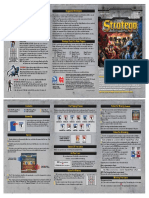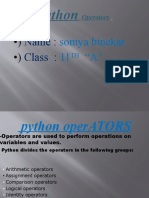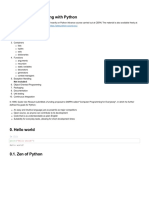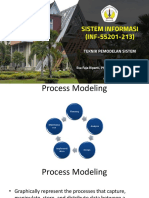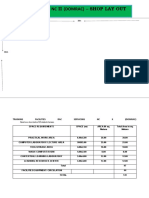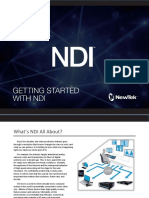Shivam Singh @Shivvvaam
6 ESSENTIAL
STEPS TO LEARN
PYTHON
EFFECTIVELY IN
2025
Swipe
� Shivam Singh @Shivvvaam
1. Understand Why You’re Learning
Python
Define your motivations for learning Python—it’s a versatile
language with applications in automation, data analysis,
software development, and more. Consider these questions:
What are your career goals? (e.g., data science, web
development)
What problems are you solving? (e.g., automating tasks,
analyzing data)
What interests you? (e.g., AI, building applications)
What’s your current skill level? (Beginner or experienced?)
Your answers will help structure a tailored learning plan and
keep you motivated throughout the journey.
Swipe
� Shivam Singh @Shivvvaam
2. Getting Started with Python Basics
Understand the Basics: Learn key concepts like variables,
data types, operators, and code readability. Start with an
introductory course on Python for data analysis.
Install Python: Set up your development environment by
downloading Python from its official site, using Anaconda,
or exploring browser-based tools like DataLab. Follow a
setup guide for step-by-step instructions.
Write Your First Program: Begin with a simple "Hello,
World!" script to grasp Python's syntax and structure.
Explore Data Structures: Master lists, tuples, sets, and
dictionaries to manage and manipulate data effectively.
Control Flow: Use if-statements, for-loops, and while-loops
to make decisions and execute repetitive actions.
Learn Functions: Build reusable code blocks with Python
functions and follow best practices for maintainable and
efficient code.
Swipe
� Shivam Singh @Shivvvaam
3. Master Intermediate Python
Concepts
Once you're comfortable with the basics, dive into more
advanced topics to expand your skills:
Error Handling & Exceptions: Learn how to use try/except
blocks and raise exceptions to build robust programs.
Working with Libraries: Python’s strength lies in libraries
like NumPy, pandas, and matplotlib for tasks like numerical
computing, data manipulation, and visualization.
Object-Oriented Programming (OOP): Understand key OOP
concepts such as classes, objects, inheritance, and
polymorphism to write more organized and efficient code.
These concepts are vital for tackling more complex problems
in Python.
Swipe
� Shivam Singh @Shivvvaam
4. Learn by doing
The best way to learn Python is by actively applying your
knowledge. Here’s how you can practice effectively:
Work on Projects: Start with small tasks like automating
simple processes or building data analysis projects.
Gradually take on more complex ones like web
applications.
Join Webinars and Code-Alongs: Participate in live coding
events and webinars. Coding along with instructors helps
you learn how to apply concepts in real-time.
Apply Python to Personal Projects: Challenge yourself by
recreating tools or applications that you use. This forces
you to problem-solve and understand how things work
under the hood.
These practical approaches will help you gain experience while
reinforcing what you learn.
Swipe
� Shivam Singh @Shivvvaam
5. Build a Portfolio of Projects
As you learn Python, create a portfolio showcasing your skills
and interests. Tailor it to the career or industry you aim for,
emphasizing original projects and problem-solving abilities.
Beginner: Simple projects like a number guessing game, to-
do list app, or basic data analysis.
Intermediate: Web scraper, blog website with Django, or
machine learning model with Scikit-learn.
Advanced: Full-stack web app, complex data analysis, or
deep learning model using TensorFlow/PyTorch.
This portfolio will be a great reflection of your progress and
capabilities.
Swipe
�Shivam Singh @Shivvvaam
6. Keep challenging yourself
Never stop learning. Once you've mastered the
basics, look for more challenging tasks and projects.
Specialize in areas that are relevant to your career
goals or personal interests. Whether it's data science,
web development, or machine learning, there's
always more to learn in the world of Python.
Remember, the journey of learning Python is a
marathon, not a sprint. Keep practicing, stay curious,
and don't be afraid to make mistakes.
Swipe
























